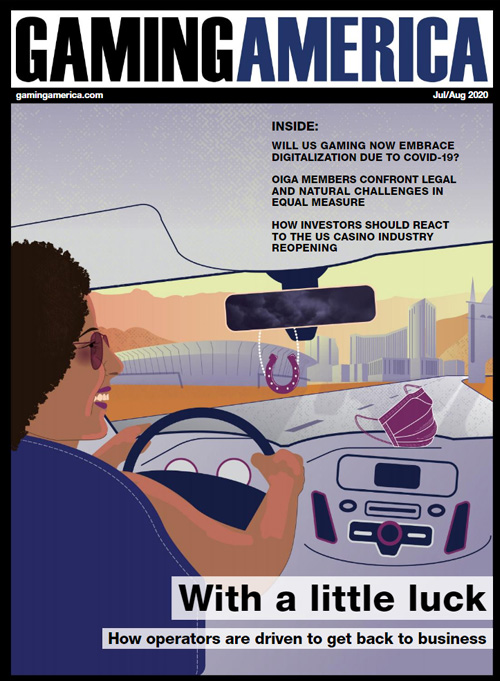
At the height of the coronavirus pandemic in March, share prices in US gaming hit a low that would have been unthinkable in 2019. MGM Resorts International sat at $7.14 per share; Caesars Entertainment tanked at $3.52; Boyd Gaming also fell to below $8 and stocks across US gaming were at an equally depressed level. An unprecedented global situation had made an unprecedented impact in the stock market.
But with the US casino industry now reopening, and stocks slowly recovering, how exactly should investors react to the current situation? MGM is back at $18.21, though this is still almost half its January value. Eldorado Resorts, meanwhile, is at $42.01, up from $8.82 in March but down from $68.93 in February. Penn National has recovered well, currently at $32.14 at press time, with its five-year high in February only a few dollars above this figure at $37.81.
Clearly, there are mixed results so far, with some recoveries an instant success story and other stocks taking longer to adapt to the ‘new normal.’ So is it a good time to reinvest in the gaming sector or should traders stay away? To gauge how gaming firms will fare in the short to medium term, Gaming America spoke with Adam McLaren, VP and senior analyst at Moody’s Investor Service. Over the next 18 months or so, bond credit agency Moody’s is projecting a tough recovery for the gaming sector. And, initially, McLaren expects Las Vegas operators to see a “pretty significant” decline in the next couple of quarters.
“What we’ve tried to lay out is, clearly in the next 12 months, we think it’s still going to have results significantly below 2019, which is the baseline of a normalized year,” explains McLaren. “There will be a pretty significant decline in the next couple of quarters but the recovery is taking effect: half of US casinos are reopened but our view is at least, right now, there’s a lot of uncertainty over the health of a consumer, consideration to social distancing and unemployment.”
Similarly, Fitch Ratings, another US credit ratings provider, expects the leisure sector to lose up to 60% in revenue this year. Its analysts expect 50% capacities at casinos to be sufficient for properties in the short term, but a reluctance to travel internationally could cost gambling hubs demand for some time to come, so US casinos may have to rely largely on domestic players.
In April, Moody’s was somewhat pessimistic about the road to recovery in Las Vegas, with McLaren agreeing travel levels will remain “suppressed.” He said: “We expect the gaming sector’s road to recovery will take several years, as it will need to overcome the drag from social distancing practices and high unemployment. With travel levels still suppressed across the country and the important convention business likely to be slow to ramp up, we anticipate it will take longer for Las Vegas operators to recover. We also expect leisure customers on a regional basis to come back first. As such, we continue to believe Las Vegas Strip operators’ revenue and profitability will lag behind regional casinos.”
McLaren, however, does hold more hope for 2021. With Moody’s projecting EBITDA levels falling 70% for 2020, he sees this number only going 30% below 2019 levels in 2021. “In 2021, we’re looking at potentially 30% below 2019 levels. That’s a pretty good indication providing there is no second wave of the virus,” he says. “It’s a significant improvement from an unprecedented operating environment. If companies are 30% down from 2019, you have to consider 2019 was a pretty strong year. So there will be recovery – it will just take a bit longer.”
In the short term, too, Moody’s does see pent-up demand boosting casinos. The early suggestions for the bond credit agency are that early activity back in casinos should be stronger than “a typical day” before the pandemic. There has certainly been plenty of buzz created by the Las Vegas Strip’s reopening, as well as properties like the Hard Rock Seminole in Florida and others across the US. News reporters in the US have been quick to capture and broadcast footage of lengthy lines filled with expectant customers.
McLaren says: “What we’re hearing is that those that open are experiencing stronger days than a typical day. There are no hard numbers yet but it sounds like near-term demand could be fairly strong. What’s different now to other recessionary environments is people have been cooped up in their houses and people are lookingto go out and do something for a change. Once they have that demand, we think people will be returning to casinos.”
Aiding this demand could also be stimulus money from the US Government, as the economy is helped back onto its feet following the coronavirus pandemic. The effects of this situation can be a double-edged sword, though, with bettors having to choose between gaming funds and their financial health. “Stimulus money could make its way onto the casino floor, at least initially,” McLaren explains. “But in a recessionary environment, unemployment is up. We think it’ll come down but there can be pull back as consumers start looking at their personal financial health and unemployment levels. Demand could be impacted as a result.”
A more clear-cut source of encouragement for investors comes from the debt market. Where the long-term health of casinos is involved, lenders have been all too keen to provide firms with the funding they require to survive the pandemic. In regard to actual casino closures, there has only been a small amount, while firms such as Scientific Games, Eldorado, MGM, Caesars, Boyd and more have gained access to revolving credit facilities to help their balance sheets.
“The debt markets have been open for casinos,” McLaren says. “That just speaks to the market access some of them have had. That bodes well and shows investors casinos will be ramping up – and in a much better position than the last three months.”

